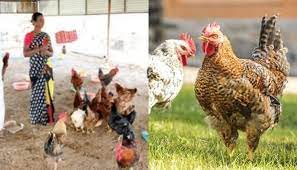SCIENTIFIC MANAGEMENT OF BACKYARD POULTRY FARMING
According to Livestock Production Statistics of India-2022 report, India stands 3rd in egg production, 5th in poultry production and 6th in poultry meat production in the world. In year 2022, the consumption of poultry meat in India was found to be over four million metric tons. These days , there is an increase in the average income and the urban population , which has led to tremendous increase in the poultry demand and a steady increase in consumption. Poultry meat and eggs can be available from commercial farm and from backyard poultry farming system.
Backyard poultry farming is an age old farming system adopted at village level. Farmers are rearing backyard poultry as it can serve as a source of employment for them and it can also meet the nutritional requirements of the family members also. Our country, India is an agrarian country. Around 65% of its population reside in the rural areas and 47% of it depends upon agriculture for livelihood ( Economic Survey 2022-23). Majority of the rural people lacks skills and are resource poor. So, they usually count upon the manual labour for survival. The backyard poultry farming is a low cost or zero cost input system and can create self employment opportunities among the farmers.
Breeds which can be reared under backyard Poultry system
Backyard poultry farming involves rearing of indigenous/genetically improved poultry birds.
- Indigenous/native breeds common in Backyard Poultry system:
- Aseel :
- Known for high stigma , majestic gait and fighting qualities
- Larger among indigenous breeds
- Cock weighs around 3-4kg and hen around 2-3kg
- Egg production 92 eggs per year
- Start laying eggs at 6-7 months of age
- Kadaknath :
- Also known as ‘ kalamasi’ because of its black flesh
- Breed is known for good taste of meat
- Annual egg production is 80
- Cock weighs around 1.6kg and hen 1.2kg
- Punjab Brown :
- Cock weighs around 2.1kg and hen is 1.5kg
- Annual egg production 60-80
- Egg shell colour is mostly light brown
- Chittagong :
- Cock weight 3.5-4.5kg
- Hen weight 3-4kg
- Large game bird
- Present in north-eastern states of India
- Busra :
- Average weight of cock is around 1.1kg and hen weighs around 1kg
- Small to medium size breed
- Annual egg production 45-55 eggs
- Nicobari :
- Cock weight is 1.8kg and hen weight is 1.3 kg
- Considered as good layer among native birds
- Egg production is approx 150 eggs per year
- Improved varieties of layers for rural production –
- CARI Hitkari :
- Cock and hen weighs around 1.7 and 1.3kg and 20 weeks of age
- This is a cross of Indian native Naked Neck and CARI Red
- Annual egg production is 200 eggs
- Developed by ICAR-CARI, Izzatnagar, Uttar Pradesh
- CARI Upkari :
- Cock and hen weighs around 1.6 and 1.2 kg and 20 weeks of age
- Annual egg production is 200 eggs
- Developed by ICAR-CARI, Izzatnagar, Uttar Pradesh
- Kaveri :
- Average weight of birds is 2-2.2 kg at 20 weeks of age
- Excellent scavenger
- Annual egg production is 130-140 eggs
- Developed by CPDO, Bengaluru , Karnataka
- CARI Sonali Layer :
- Also known as Golden-92
- Cross between White Leghorn and RIR
- Annual egg production 280 eggs
- Developed by ICAR-CARI, Izzatnagar, Uttar Pradesh
- Krishilayer :
- Weight at 72 weeks of age is 1.7kg
- Total egg production at 72 weeks is 270-280
- Developed by ICAR-DPR, Hyderabad, Telangana
- Gramapriya :
- It is a layer type variety
- Developed by the Project Directorate On Poultry Hyderabad
- Cock weighs 1.2-1.5 at 15 weeks
- Bird can produce 230-240 eggs in a year and it lays 160-180 eggs in free range condition provided with minimum supplements.
- It lays brown eggs
- It is hardy and better liveability
- Improved dual-purpose breeds of poultry in India-
- Vanaraja :
- It is a dual purpose breed
- Developed by the Project Directorate On Poultry Hyderabad
- Cock weighs around 1.2-1.5kg at 10 weeks
- Hen lays approx. 120-140 eggs per year
- Disease resistance
- Survival rate is good
- Appealing feather colour
- Lays brown eggs
- Giriraja :
- Suitable for mixed as well as backyard poultry farming
- Developed by Karnataka Veterinary , Animal and Fishery Sciences University in Banglore
- Egg production is around 130-150 eggs per year
- Eggs have good hatchability which will help the farmers in raising own birds
- These birds possess better growth rate than other local varities
- These birds are good scavengers so can be easily kept in free range
- Rainbow Rooster :
- Multi-coloured dual purpose breed
- Egg production 160-180 eggs per bird
- Able to sustain in free range and backyard rearing conditions
- High resistance
- Pratapdhan :
- Average body weight of bird at 20 weeks of age is around 1.3-2.7kg
- Annual egg production is 161 eggs
- Developed at AICRP-MPUAT, Udaipur, Rajasthan
- Starts laying eggs at 125 days
- Aseel cross :
- Average body weight at 15 weeks of age is 1.2kg
- Two colors black ( aseel kala ) and red (aseel peela )
- Annual egg production 120-140
- Delevoped at CPDO, Bengaluru, Karnataka
It is also observed that majority of the rural households which depend upon the manual labour for livelihood faced problems like unemployment, hunger, malnutrition and low living standards. The Backyard poultry farming is gaining popularity among rural and resource poor areas of India. It provides rural and poor families with income, nutritionally rich food sources like meat and eggs, elevates women and jobless youth. There is not much need of infrastructure setup for rearing of poultry in backyards and is can be easily managed by women, children and even elder family members. Secondly, Poultry eggs and meat are the excellent and low-cost source of protein, which are effortlessly available to meet the demand of protein for rural and poor people.
Backyard Poultry farming is a cost effective business which requires low inputs or almost equals to no input. It is distinguished by indigenous night shelter system, scavenging system with very less or no supplementary feeding, natural hatching of chicks, poor productivity of birds, local marketing and no health care practice.
The backyard poultry farming is one of the leading sector for the food security and for elevating the living standards by generating empowerment to the rural landless impoverished farmers.
Compiled & Shared by- This paper is a compilation of groupwork provided by the Team, LITD (Livestock Institute of Training & Development)
Image-Courtesy-Google
Reference-On Request
Economic feeding of Backyard poultry in India

Economic feeding of Backyard poultry
SCIENTIFIC MANAGEMENT OF BACKYARD POULTRY FARMING


